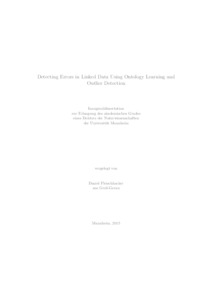|
Detecting errors in linked data using ontology learning and outlier detection
Fleischhacker, Daniel
![[img]](https://madoc.bib.uni-mannheim.de/41798/1.hassmallThumbnailVersion/thesis-druck-1.pdf)  Vorschau |
|
PDF
thesis-druck-1.pdf
- Veröffentlichte Version
Download (2MB)
|
|
URL:
|
https://madoc.bib.uni-mannheim.de/41798
|
|
URN:
|
urn:nbn:de:bsz:180-madoc-417981
|
|
Dokumenttyp:
|
Dissertation
|
|
Erscheinungsjahr:
|
2015
|
|
Ort der Veröffentlichung:
|
Mannheim
|
|
Hochschule:
|
Universität Mannheim
|
|
Gutachter:
|
Stuckenschmidt, Heiner
|
|
Datum der mündl. Prüfung:
|
11 März 2016
|
|
Sprache der Veröffentlichung:
|
Deutsch
|
|
Einrichtung:
|
Fakultät für Wirtschaftsinformatik und Wirtschaftsmathematik > Practical Computer Science II: Artificial Intelligence (Stuckenschmidt 2009-)
|
|
Fachgebiet:
|
004 Informatik
|
|
Normierte Schlagwörter (SWD):
|
Semantic Web , Ontologie , Wissensextraktion , Fehlererkennung , Linked Data
|
|
Freie Schlagwörter (Englisch):
|
Semantic Web , Ontology , Information Extraction , Error Detection , Linked Data
|
|
Abstract:
|
Linked Data is one of the most successful implementations of the Semantic Web idea. This is demonstrated by the large amount of data available in repositories constituting the Linked Open Data cloud and being linked to each other.
Many of these datasets are not created manually but are extracted automatically from existing datasets.
Thus, extraction errors, which a human would easily recognize, might go unnoticed and could hence considerably diminish the usability of Linked Data.
The large amount of data renders manual detection of such errors unrealistic and makes automatic approaches for detecting errors desirable.
To tackle this need, this thesis focuses on error detection approaches on the logical level and on the level of numerical data.
In addition, the presented methods operate solely on the Linked Data dataset without a requirement for additional external data.
The first two parts of this work deal with the detection of logical errors in Linked Data.
It is argued that an upstream formalization of the knowledge, which is required for the error detection, into ontologies and then applying it in a separate step has several advantages over approaches that skip the formalization step.
Consequently, the first part introduces inductive approaches for learning highly expressive ontologies from existing instance data as a basis for detecting logical errors.
The proposed and evaluated techniques allow to learn class disjointness axioms as well as several property-centric axiom types from instance data.
The second part of this thesis operates on the ontologies learned by the approaches proposed in the previous part.
First, their quality is improved by detecting errors possibly introduced by the automatic learning process.
For this purpose, a pattern-based approach for finding the root causes of ontology errors that is tailored to the specifics of the learned ontologies is proposed and then used in the context of ontology debugging approaches.
To conclude the logical error detection, the usage of learned ontologies for finding erroneous statements in Linked Data is evaluated in the final chapter of the second part.
This is done by applying a pattern-based error detection approach that employs the learned ontologies to the DBpedia dataset and then manually evaluating the results which finally shows the adequacy of learned ontologies for logical error detection.
The final part of this thesis complements the previously shown logical error detection with an approach to detect data-level errors in numerical values.
The presented method applies outlier detection techniques to the datatype property values to find potentially erroneous ones whereby the result and performance of the detection step is improved by the introduction of additional preprocessing steps.
Furthermore, a subsequent cross-checking step is proposed which allows to handle the outlier detection imminent problem of natural outliers.
In summary, this work introduces a number of approaches that allow to detect errors in Linked Data without a requirement for additional, external data.
The generated lists of potentially erroneous facts can be a first indication for errors and the intermediate step of learning ontologies makes the full workflow even more suited for being used in a scenario which includes human interaction.
|
 | Dieser Eintrag ist Teil der Universitätsbibliographie. |
 | Das Dokument wird vom Publikationsserver der Universitätsbibliothek Mannheim bereitgestellt. |
 Suche Autoren in Suche Autoren in
Sie haben einen Fehler gefunden? Teilen Sie uns Ihren Korrekturwunsch bitte hier mit: E-Mail
Actions (login required)
 |
Eintrag anzeigen |
|
|
